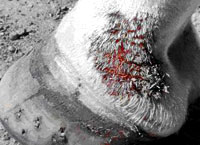Winter care for your equine
Posted by on Dec 3, 2008 in Donkeys, Horses, Welfare | 0 commentsWinter brings with it some additional challenges for horse and donkey owners. Admittedly, wallowing around muddy fields in the dark evenings isn’t to be relished, but we all do it because we love our 4 legged friends!
Most important to get right at this time of year is feeding-how much, how often and what type. Obviously as the temperatures plummet, your horse will need correct nutrition to help keep himself warm. Once temperatures drop to under 5 degrees you will notice that the grass growth rate will slow right down. Most important on the feed list therefore, would be to supply stabled and field kept equines with good quality hay or haylage. This digestion of fibre will help to maintain temperature levels and keep weight on. Feeding hay off the floor (eg trough or hayrack) will save on wastage and so be better on the pocket. Beet pulp is also a good provider of fibre and can be found in France under the name ‘pulpe de betterave’. Hard feed may also be necessary particularly if you have a horse in work, pregnant or elderly. If feeding cereals, one of the tried and tested methods to help maintain condition is feeding boiled barley. It doesn’t put the ‘fizz’ into a horse’s temperament that feeding bruised oats or barley can do. It is important that it is cooked with plenty of water until the grains split, and even the fussiest feeders love it. Feeding oil in the feed (eg soya, linseed, cod liver) will also help your equine to keep condition, this must be introduced into the diet slowly though. A salt or mineral block in the shelter/stable or/and adding a broad spectrum vitamin/mineral supplement is also beneficial at this time of year…………
Next on the list is probably making sure that your equine has shelter if he is living out throughout the winter. Ideally a built shelter (abri) or barn, but if not, try and ensure he has some natural shelter in the field from the biting winds and rain. This is especially essential for donkeys who do not have as much oil in their coats as horses.
Ensure you have thought about water at this time of time of year. Where will the water come from when the hose or automatic waterers freeze up? Water containers you can fill up from the house are always handy to have about. Break the water in buckets and troughs at least twice a day when its below freezing as they will probably be drinking more because of the forage intake.
Age, health and living enviroments will dictate whether or not you will need to rug your equine. Remember to remove and check each day under the rug for weight loss, rubbing and if he’s the correct temperature.
The dreaded mud! It’s unavoidable at this time of year but there are ways to manage it. Careful consideration for positioning of water troughs, diverting water with drains/guttering or creating hard-standing areas in gateways to name but a few. Mud can also bring with it a condition known as mud fever (gale de boue), caused by the bacteria dermatophilus congolensis.
Symptoms can range from a mild skin irritation on the heels to painful infected sores. There are various opinions on preventing mud fever, and if possible most vets now recommend not washing the mud off but to allow to dry naturally then brushing off. However, once there is a problem with mud fever, and assuming the infection is very mild, this will work if the hair is not too long, and can dry relatively quickly to allow a treatment cream to be used. Unfortunately this is not always practical, as the mud can take a long time to dry in the cold weather, and allow the bacteria to get a hold under the covering of damp,muddy hair, a likely scenario if the animal lives out. It is often more sensible to wash the wet mud off, using a product such as Hibiscrub ensuring all mud and crusty scabs have been removed, bring the horse into a mud free area, dry the legs completely and then apply an antibacterial cream to the affected areas. For more severe infections, the equine will probably need the hair clipped around the sores to allow easy application of an antibacterial cream, and the legs kept completely dry until the sores are close to healing, even if this involves stabling for a period of time.Then a barrier cream can be applied to dry clean legs as a preventative measure. As well as the conventional mud fever, there is a condition called Pastern Leukocytoclastic Vasculitis. This is when the ‘mud fever’ seems to be spiralling out of control, and it is best to have veterinary advice as steroidal creams and cortizone injections are neccessary to halt its progress.This disease can also occur in the summertime when there is very little mud. There is also a range of supplements on the market you can feed to promote healthy skin.
Well enough of the doom and gloom of winter…there’s always something quite magical about watching a horse snort out a puff of warm air like a mythical dragon as the sun rises on a cold and frosty morning.



